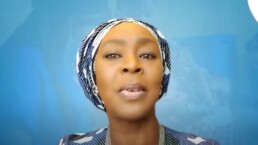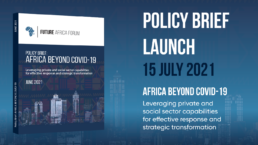Every country around the globe is fighting their own battles with the COVID-19 pandemic. The lessons from the Ebola outbreak of 2013 that struck Guinea, Liberia and Sierra Leone forecast some of the complications that lie ahead in tackling COVID-19 on the African continent and gives some insight into the difficult recovery period that lies ahead. If the experiences from Ebola tell us anything, it will take years for many countries to bounce back from the global pandemic as they tackle not only the virus itself but a complex myriad of pre-existing internal challenges. Recovery will call for political will and innovation at a scale beyond what the continent has demanded before.
One advantage that Guinea, Liberia, and Sierra Leone had when the Ebola Virus Disease (EVD) struck, was overwhelming support from the international community. Within weeks of declaring an emergency in each country, international funding and personnel came in overwhelmingly to support the governments of the three countries. According to the Centers for Disease Control (CDC), the three countries had received more than $3.611 billion (USD) by December 2015 from the United States, the United Kingdom, and Germany, the three biggest donors to the emergency response.
This time around it is different. Beyond committed and emerging funds from international funding bodies such as USAID, the EU and the World Health Organization (WHO) fund for emergency response, indications are that limited support is trickling down to the African continent. The current focus of the developed world is on flattening the curve of the spread of COVID-19 in Europe and the United States. This effort could take months and, in that time, the caseload in Africa is steadily increasing. For the most vulnerable countries, this requires optimizing the use of existing, often limited, resources at the disposal of governments and health facilities without crippling vital economic activity and dropping the ball on other healthcare needs.
Moreover, the messages of flattening the curve are somewhat problematic for the African continent. Overcrowded communities and limitations in Water, Sanitation and Hygiene (WASH) for large subsections of Africa make it difficult to enforce two key messages of curbing the spread of COVID19: social distancing and washing hands. Further complications include mistrust of public systems, myths surrounding the virus, mass poverty and “hand to mouth” livelihoods which make the practicality of implementing scenarios such as lockdowns not only difficult to enforce but life-threatening for many. For example, the recently imposed 21-day lockdown in South Africa will disproportionately affect the poorest families, and hunger-related illnesses and deaths are as likely as the threat of contracting the virus in overcrowded informal communities such as Alexandra in the Gauteng province of South Africa.
Accounts from survivors after the EVD epidemic illustrate some of the challenges. A young woman’s experience during Ebola, the sole survivor in her household, stuck with me. Before the outbreak, she made an income on mobile sales of used clothes out of a bag in Margibi County, Liberia. When one family member got sick, despite the constant public messaging, the family did not report the sickness, assuming it was something else (early-stage EVD symptoms are similar to Malaria which is common in West Africa). The extended family in the home took turns to care for the individual. One by one, in a single household of about 15 people, they fell ill and died. While she and some of her family were eventually taken to quarantine facilities and cared for, the others did not survive. After the outbreak, the young woman could not continue her business which she had begun with meager savings, as the house she lived in had to be sanitized with chlorine-based products and all her “market” was destroyed.
While the fatality rate of COVID-19 is less stark, the risks to livelihoods are equally daunting and could take years to address across the continent.
The December 2014 World Bank summary of the impact of the Ebola Virus Disease (EVD) on Liberia, Sierra Leone and Guinea one year into the two and a half year outbreak illustrated the crippling impact of the virus on the GDP of each country. The projected growth rates for all three countries were reduced drastically within a matter of months with Sierra Leone experiencing the biggest hit. Sierra Leone’s growth estimates fell to a projected -2% for 2015 from a pre-Ebola estimate of 11.3% in 2014. Many businesses that closed during the EVD outbreak never re-opened, causing an increase in unemployment and vulnerable households. Many technical experts with years of institutional knowledge in various sectors who left during the outbreak in the three countries never returned, and governments and the private sector have struggled to regain pre-Ebola growth rates.
Another lag to stalled economic growth has been political cycles which prompted potential investors to hold off for guarantees of post-election stability and continuity. Down the line, there remain growing pains from the “young” administrations in Sierra Leone and Liberia and governance challenges in Guinea.
The unique mix of factors that will impact recovery from COVID-19 are different for each country in Africa, but the underlying vulnerabilities remain the same.
However, the opportunities that the continent possesses remain unchanged. Recovery will require that governments make swift, decisive and context-relevant decisions for their citizens in the immediate future while looking to post-pandemic recovery. Some emergency response structures may be maintained past the pandemic to bring urgent redress where it is needed most. This will include areas such as quality education needs, food security concerns, employment creation and investment policies as befitting each unique context.
Many countries outside the continent will continue to rely on Africa for production, raw materials, and human resources. This gives African countries (e.g. Ethiopia) that are creating large scale employment for citizens incentive to strengthen their policies and measures for future investments and address employee insurance against periods of indefinite global shock such as has been created by COVID-19. In the medium term African countries invested in economic growth via private sector and/or public sector investment approaches may incorporate continuous learning opportunities for youth who are vulnerably employed. Giving youth an opportunity to continue learning in non-traditional formats while making an income provides them pathways to access more stable livelihoods in the long term.
While strengthening the private sector and providing the right mix of incentives to business development is key,education, healthcare and food security remain a critical baseline for long term resilience in African economies.
One of the reasons why Ebola and now COVID-19 is so devastating to the continent is the sparsity of healthcare systems, even for those countries performing well in economic terms. When Ebola hit Liberia in 2014, there were only about a dozen functional ambulances in the country to cater to a population of more than 4 million. In all of the three affected countries, emergency response protocols were developed ad hoc and in parallel with response on the ground. The time lost to ill-equipped healthcare systems costs lives. Increased budgetary support to healthcare systems is critical beyond the response to COVID-19. In addition, easily accessible centralised data systems will save critical time in coordinating and containing subsequent public health threats.
Food security must be speedily addressed in the immediate and long term. In the immediate term this may require sourcing supplies from around the world in places where food production is continuing and outside of regular supply chains. Governments must be prepared to procure food at a higher cost than usual. At a time when global demand is at an all time high and production and distribution at an all time low, a prolonged COVID-19 crisis could be catastrophic for Africa and compound recovery challenges post pandemic. Agriculture Ministers must step up to ensure any food production domestically is scaled up as much as is feasible. This is however difficult to achieve in the short term due to the technical inputs and preparedness requirements to stockpile adequate food supplies for an indefinite period. Long term food security plans tied to domestic production must be put in place to allow countries to hit the ground running as each country emerges from the pandemic.
On the whole, when COVID-19 is eventually contained in stages across the globe, African governments must ensure that the recovery of external economies are not at the disadvantage of their own. Many of the long standing policies in place across Africa today serve functionality but not practicality and even the countries that introduced these policies to Africa have evolved and adapted deftly to global changes. The policy decisions that African governments make going forward need to be aligned to current international trends and sustain the out of the box and innovative thinking that has been employed across the continent in response to COVID-19.
After Ebola ended in 2016, the economies of Liberia, Sierra Leone and Guinea had to recover within the context of a world that had moved ahead while the three economies stalled. While unfortunate, the COVID-19 pandemic could be an eye-opener for the continent to prepare for future emergencies by focusing on building resilient internal structures that can provide cushions from shocks. Political will and fostering an environment for innovation will be key for the immediate post-COVID-19 future of Africa and beyond.
The views expressed in this article are those of the author alone and not the Future Africa Forum.
The views expressed in this article are those of the author and do not necessarily reflect the views of Future Africa Forum. Future Africa Forum is a pan-African policy think-tank and policy advisory consultancy headquartered in Nairobi, Kenya.



